25 Points: New Tab
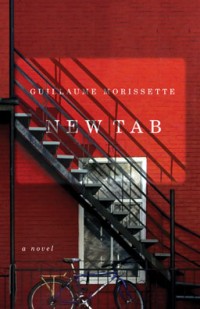 |
New Tab
by Guillaume Morissette
Véhicule Press, 2014
224 pages / $19.95 buy from Véhicule Press or Amazon
|
1. Video games don’t offer happiness—or exciting work environments.
2. This novel reminded me how bad I am at French. (My dreams of conversing with Guillaume in a foreign language are crushed.)
3. My generation is both really poor and unhappy—even with college degrees and semi-supportive parents. (On the bright side: we like to party a lot.)
4. Don’t know why Ines and company allowed Dan to live with them. Even if he did offer to pay cash up front, why would you want to live with a creepy forty-something?
5. This novel furthered the American stereotype that Canadians drink a lot of beer.
6. Brent’s an asshole—I don’t like him. (Whomever “Brent” was based off of, if you’re reading this, I hope we’re given an opportunity to meet and reconcile so my current opinion of you can change to a more positive one.)
7. When I first started this novel, the writing style kind of reminded me of Taipei by Tao Lin—but I got over that quickly because Morissette’s characters were actually interesting.
8. To reiterate: I liked this novel way more than Taipei.
9. To whomever “Cristian” is based off of: let’s build an ice rink together.
10. This novel really made me want to move to Montreal. Apparently that’s where the party’s at.
August 7th, 2014 / 12:00 pm
25 Points: Sorrowtoothpaste Mirrorcream
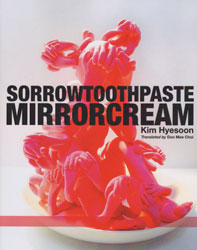 |
Sorrowtoothpaste Mirrorcream
by Kim Hyesoon, translated by Don Mee Choi
Action Books, 2014
106 pages / $12.00 buy from Action Books or Amazon
|
1. I requested a review copy of this book because I loved Don Mee Choi’s previous translation of Kim Hyesoon’s All the Garbage of the World Unite.
2. I loved it so much that I would read one of her poems at my own poetry readings (not as my own of course, but yeah I wish I’d written them).
3. Secretly, I want to brush my teeth with sorrowtoothpaste. Doesn’t seem like it’d be overly minty. And if I used mirrorcream, I’d wonder if I’d see myself as others see me.
4. The first great phrase in this book is “clammed up like a cavity-ridden piano.” We are introduced to to characters, Melan and Choly. They are my friends too.
5. I feel these poems the way I feel seaweed in my teeth: uncomfortable but familiar.
6. The poem, “Glasses Say” might be some re-imagining of Adrienne Rich’s “Diving into the wreck.” I said might:
“…A vacant place. Only fan shells, a hook, an oxygen tube, a pair of goggles.
And a lady behind the goggles.
I shave a large piece of ice to make lenses.
I put the lenses in my mouth.
It’s raining in the sea.”
7. Umbrellas, ocean, water, ice. Nipples, milk, clouds, spit.
8. As I read, I’m not sure if what I’m seeing is what I’m really seeing, or if what I’m feeling is really feeling what I’m feeling. The sadness doesn’t overwhelm me. It sits in my chest like an orb, just sort of just glowing. I remember what this feels like. I have been this sad. I don’t think my sad was this beautiful.
9. “…I’m filled with all the screams of the world / that there is nothing else but that…”
August 5th, 2014 / 12:08 pm
25 Points: Seiobo There Below
 |
Seiobo There Below
by László Krasznahorkai
New Directions, 2013
440 pages / $17.95 buy from Amazon
|
1. I almost laugh, attempting to write anything about the Krasznahorkai, since I’ve done an interview with the translator for The Paris Review, and feel my work is done here, and also since we are dealing with a nearly 500-page book that lashes out in chunks of twelve-page sentences, transcendent, dazzling, insane, hilarious, vicious and brutal, determinedly unexplainable and unexplained.
2. Transparency is not the hallmark of the Krasznahorkai.
3. But ok. This is the Hungarian writer at the forefront of a renaissance in Hungarian letters, an intense, experimental madman whose books are metaphysical puzzles of stunning originality and brilliance.
4. This is a man with burning eyes and a cheap suit, who shows up at Columbia to a packed house and reads…in the dark…in Hungarian…and kinda actually scares people.
5. There’s a quote from Susan Sontag on the back of Seiobo There Below that calls László Krasznahorkai “the Hungarian master of the apocalypse,” which is intimidating, and doesn’t sound like much fun. Do not be scared away; this book is a pleasure to read, and even funny.
6. The last chapter is named “Screaming Beneath the Earth,” which is a reverse riff on the first phrase of Gravity’s Rainbow, “A screaming comes across the sky…”, and gives an idea of the author’s ambition. The book is an incoming rocket, taking on the small matter of the power and transcendence of art.
7. Krasznahorkai has the interesting idea, though I’m not sure I’m convinced, that good art is dangerous. Art in this book tends to overpower ordinary people or drive them insane. Is this pretentious? Probably, right? Real migrant workers are not often driven mad by the sight of glorious paintings.
8. But then again, I also believe in salvation through art. What is a God without destructive power?
9. Seiobo There Below is structured in a series of sections, mostly about artists making art, a few about tourists or exiles. Sections include a modern-day man visiting the Acropolis, a Japanese Noh actor speaking to his disciples, another Japanese artist making a mask, a stork hunting in a river, a Renaissance painter in his workshop, an immigrant in Barcelona.
10. Some quotes: “…to stand there, to look at this life withdrawing for all eternity into death in the human and natural landscape, and to depict what is before him when he looks up from the blank canvas: that is everything…”
July 31st, 2014 / 2:02 pm
Sortes Poundianae
 |
The Cantos of Ezra Pound
by Ezra Pound
New Directions, 1996
896 pages / $25.95 buy from Amazon
|
1. In the Middle Ages, as a practice of divination, as a method of drawing lots and to soothsay, to learn what might be the wrath to come, to draw out a linear progression from a dark mass of chaos, those with access to Virgil’s Aeneid might practice Sortes Vergilianae. The instructions were simple: fetch a copy of the epic poem, let the weary spine fall where it may, and whatever passage the eye lighted on the reader interpreted as indicative of prophecy.
2. My copy of The Cantos of Ezra Pound is a fresh New Directions paperback with the spine still intact. Regardless, it looks ominous. The backdrop black with serifed white letters stamped down on the cover. At twelve years old and knowing nothing of Ezra Pound, I picked the book up because it looked Biblical and heavy, like תֹהוּ וָבֹהוּ, the waters of Genesis 1:2.
3. The Cantos present chaos before the Spirit of God levitates over the deep. Although Pound principally brings forward “light” as his favorite element of spirituality and mysticism, darkness pervades the poem. It’s universally acknowledged that the work turns on an axis based more on Inferno than Paradiso.
4. Interviewed by Donald Hall in The Paris Review, who spent three days with Pound in Italy during the early 1960s, a restless and writer’s block-inflicted Pound comments, “It is difficult to write a paradiso when all the superficial indications are that you ought to write an apocalypse. It is obviously much easier to find inhabitants for an inferno.”
5. After publishing Thrones de los Cantares, the penultimate section of the Cantos, Pound admits, “Okay, I am stuck.” One imagines him gazing out the window, sunlight revealing a Roman street where, if you dig far enough, discoveries of pagan rites abound. He continues, pulling at his beard, “The question is, am I dead.”
6. The aforementioned Hebrew typically translates as “without form and void” (KJV). It can also mean “utter confusion,” a feeling most readers share when tackling the Cantos. Pound’s classic outline for his epic poem, from a letter to his father (who was appropriately, I kid you not, named Homer), begins, “Live man goes down into world of Dead.”
7. Pound, like his hero Odysseus, descended into Hell and still lived to see daylight. Kept outdoors for many weeks near Pisa, Pound was a caged panther, captive of the US military in 1943. During this time or immediately afterwards, he promptly went insane, dubbed mentally unfit to stand trial, housed in the “bughouse” of St. Elizabeths Hospital for thirteen years. As the story goes.
8. To draw lots, to soothsay out of an inferno, is simply not done. It reminds one of the Faust legend, or Robert Johnson’s railroad deal with the devil. Like a Oujia board for literary nerds (or, more properly, “bibliophiles”), a variety of sortes tempt many.
9. But The Cantos beckon. Suck a poor poet into their orbit. They are sirens. Robert Frost mentions, in a 1960 interview with the Paris Review, how Ezra Pound practiced jujitsu on him in a restaurant. “So I stood up, gave him my hand. He grabbed my wrist, tipped over backwards and threw me over his head.” Like its writer, the poem practices a similar sort of action on the reader.
July 29th, 2014 / 12:00 pm
20 Points: When a Lady (Shakes Hands With a Gentleman)
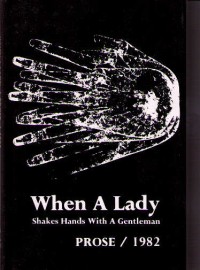 |
When a Lady Shakes Hands With a Gentleman
by Nikolai Bokov, Mark Insingel, Gertrud Leutenegger, Claude Ollier
Red Dust Books, 1982
96 pages / $8.95 buy from Amazon
|
1. Throughout the course of When a Lady, a very engaging 1982 collection from Red Dust, Inc, the contributors display a rigorous commitment to the avant-garde tradition of de-automatizing perception, as outlined by Shklovsky, and broken down like a boss here by A.D. Jameson
2. The Belgian novelist/ Concretist poet Mark Insingel reworks aphorisms and banal lanuage tropes.
3. “When a lady shakes hands with a gentleman (plucks out a gentleman’s eye) she does not remove her glove.”
4.
5. “How can the drop that made the cup run over be the same as the drop to which the cup is drained? (How can the drop to which the cup is drained be the same as the drop that made the cup run over?)”
6. “A Loves B who loves C who is adored by D, the only concern of E who wants to get rid of F who is courted by G who receives attentions from H, the idol of I who would be content with J who cannot leave K in peace who will not part from L who would prefer to go to M who has gone off with N who cannot forget O who would like to go back to P who has an eye on Q who would gladly be wooed by R who is making advances to S who is only interested in T who likes U, U need not despair at any rate (V, W, X,Y,Z).”
7.
8. Insingel looks for entrenched meanings and potentialities. He is repetitive, and redundant, and often very funny. The big blocks of mutable text ultimately represent his project, a sort of frustrated response and working with and through degraded language.
9. “Rare is beautiful/Rare is wonderful/Rare is awful./Rare is horrible./Rare is incomprehensible./Rare is possible./ Rare is deniable./ (You don’t have to accept it as true, you are not obliged to see it (it isn’t being thrown into our teeth), you need not have anything to do with it (go into it) it can’t frighten you at all (the chances are much too small), you can dream about it (wet dreams—nightmares), you can actually have a cozy chat about it.)”
10. Claude Ollier, explores sensations connected with memory images. In his project he interrogates some of the “word as signifier” aspects of language, dwelling on strange associations and essentially personal multiplicities in words.
July 17th, 2014 / 12:00 pm
25 Points: Even Though I Don’t Miss You
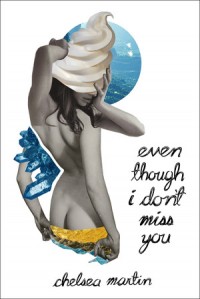 |
Even Though I Don’t Miss You
by Chelsea Martin
Short Flight/Long Drive Books, 2013
|
1. In this book, Chelsea Martin reminds me of my girlfriend. She reminds of all my ex-girlfriends, she reminds me of everybody’s girlfriend. It’s hard to pinpoint why. Is she the essence of contemporary girlfriendness?
2. It provides an insight sometimes into particular shades of emotion that I don’t necessarily seem to understand (not that I want to get all ‘Men are from Mars, etc ’ or some such popular-silliness about this point).
3. Other times, it’s nice to know that I’m not entirely wrong in my assumptions about ‘What might be wrong?’, ‘When something might be wrong?’
4. I have to declare an interest and that is that I’m not really in a relationship with Chelsea Martin but this book feels so much like being in a relationship as much from a male as from a female perspective that I can’t help but think that I am and that this qualifies it as a great success in that department.
5. “There is a piece of clothing thrown on the floor in the shape of what I look like to myself”. This is a beautiful, economical image; an everyday occurrence raised to something just v profound. I imagine it to be a denim skirt for some reason.
6. It reminds me of a line from an e-book, by someone, an old free e-book by someone, possibly Richard Brammer that I can’t find at the moment (maybe I imagined it) about ‘Your bra will fade on the radiator just like the rest.’ Any ideas?
7. The sentence that many reviewers have picked from this book is worth repeating in full:
“Being in a relationship for a very long time feels just like being single except that I can’t remember the last time that I was alone for five hours.”
This has the same periphrastic quality as that which I discussed in relation to Spencer Madsen (elsewhere in a 25 Points Review for HTMLGIANT). It’s almost like a really good, lengthy title appended to a very successful piece of conceptual art. I can see why so many reviewers chose to pick it out.
8. The relationship theme is undercut throughout with the many conversations between the ‘I’ and the ‘You.’ Often humorous, sometimes sad, occasionally refreshingly absurd, like a transcription of direct speech really is. See – this is what I meant in points 1-4.
9. Again, and in relation to a Spencer Madsen review that I have just written and so which is fresh in my mind but which might as well be seen as a recurring theme, a necessarily recurring theme, of all contemporary literature, that of the wide-open spaces of potential for metaphor, analogy, etc., when it comes to everyday technological digital life, a relatively fresh opportunity ripe for figuration, Chelsea’s line: “I feel like everything I write could be mistaken for theory about Adobe Photoshop’s Clone Stamp Tool” takes some beating. Apologies, that was an awful sentence, I wrote it backwards.
10. I don’t think I’m going to apologise for mentioned other writers in these reviews. Everything has a context, right.
July 15th, 2014 / 1:50 pm
25 Points: You Can Make Anything Sad
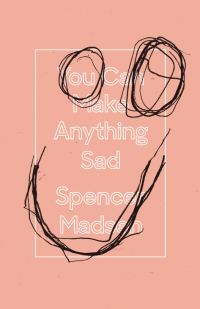 |
You Can Make Anything Sad
by Spencer Madsen
Publishing Genius Press, 2014
90 pages / $14.95 buy from PGP
|
1. Spencer Madsen’s new book has what you might call ‘a classic Alt-Lit title.’
2. Like many of his contemporaries, a fair proportion of this work is considering ‘What if…’ something happens and musing on ‘What ifs’ generally. I think this has something to do with the virtual world and what it has done to our brains. As a strategy it is, in itself, almost materially virtual.
3. There are many proper nouns. For me, proper nouns are essential.
4. Computer/technological device interface metaphors, analogies, etc., are a growth area to a large extent pioneered (as far as today’s technological landscape goes anyway) by Alt-Lit writers themselves. Madsen is very good at them. Here is one by him: ‘When you turn the screen brightness down on your computer, everything looks the same but seems a little shittier.’
5. On October 1st, 2012, Spencer encountered a man in a gym and mused on his ‘meaningless’ hairstyles, tattoos, and muscles (‘he does administrative work’) but notes that in a way this gym muscle man ‘is more authentic,’ ‘more purely veneer’ than your everyday person. This is deep, man! By which I mean that the way in which much Alt-Lit concerns itself with screens is down to the fact that screens, smoothness, etc., represent the spirit of our current age (and any age that we can imagine anytime soon on the, now non-existent, horizon) so it is important to face up to them, even if it means facing them to do so. This whole ‘life in front of small screens, large, intermediately sized screens’ is so ubiquitous it needs to be looked at. Alt-Lit does it very well, as does Spencer.
6. ‘A Tumblr called Girls Doing Things featuring photos of fully clothed girls doing normal things like standing in line at the post office or walking a dog’ would be the most genuinely erotic Tumblr of the year. Think about it, folks.
7. Nothing happens in this book in that way where everything happens or rather so many things happen that nothing seems to happen. Word thinks this is ‘verb confusion’ but it is really more about the state of things.
8. I say nothing happens but there is a half-hearted worry about coming to the end of a relationship which is recurrent but which isn’t foregrounded. Although coming to the end of a relationship is a big thing (like moving house, as they say, not enough novels about ‘moving house?’), it’s inevitable that something else will start.
9. Something else does start. He starts going out with someone new. It’s new; he likes it as we all like that kind of thing.
10. He’s good at the old poetic trick of mixing everyday concrete noun combinations like ‘cereal and milk’ with the slightly more amusing concrete noun ‘ice cream’ with a sudden abstract noun ‘emotional stability.’ This is an old trick that will never stop working. He executes it very well. I laughed.
July 10th, 2014 / 12:00 pm
25 Points: His Master’s Voice
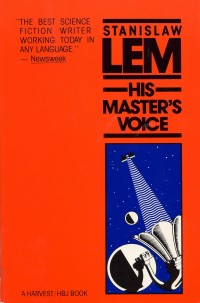 |
His Master’s Voice
by Stanislaw Lem
Northwestern University Press, 1999
199 pages / $16.95 buy from Amazon
|
1. I first read Stanislaw Lem after seeing an anonymous review of The Cyberiad on HTMLGIANT.
2. I’ve read two of his books. A year or two ago I read Solaris, then last week I read His Master’s Voice.
3. His Master’s Voice, published 7 years after Solaris, echoes the earlier book in pleasing ways. The most obvious to me was that neither ever directly answers the mystery near the heart of each book. A reader will not definitively learn the nature of the ocean on Solaris, or what the letter from the stars says.
4. HMV places human failure more centrally than Solaris. The narrator of HMV, Peter Hogarth, is (after the fact) a complete pessimist about humanity’s time facing their impossible task.
5. The book is philosophical, often profound. For example: “Our ability to adapt and therefore to accept everything is one of our greatest dangers. Creatures that are completely flexible, changeable, can have no fixed morality.”
6. Or, “Psychoanalytic doctrine reveals the pig in man, a pig saddled with a conscience; the disastrous result is that the pig is uncomfortable beneath that pious rider, and the rider fares no better in the situation, since his endeavor is not only to tame the pig but also to render it invisible.” Hogarth does not have much love for psychoanalysis throughout the book.
7. Lem would eventually focus most of his effort on writing philosophical essays and abandon the novel. Knowing this made it hard to separate Lem and Hogarth during these tangents.
8. Something I find particularly engaging about Lem’s writing is his way of introducing the reader to complex scientific and technological ideas on which he was likely not an actual expert, and doing so with authority. I’ll come back to this.
9. At one point in the book Lem uses Hogarth and another of his characters as mouthpieces for his own personal views of pulp science fiction. Lem was famously not a fan of most of his contemporary genre writers, and when the character Rappaport hits a wall in his research he resorts to reading a stack of apparently mediocre SF—“expecting variety, finding monotony.”
10. One of several reasons Lem gave for no longer writing fiction was his inability to keep up with the increasing number of papers being written on the cutting edge of science. This meant that he could no longer keep writing books involving cutting edge ideas with the sense of authority I earlier admired. Maybe he feared that without that he would be just another indistinguishable pulp science fiction author.
July 3rd, 2014 / 12:00 pm
25 Points: The Fun We’ve Had
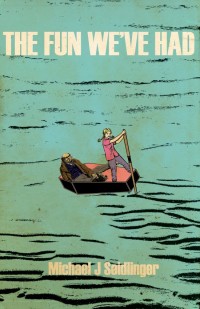 |
The Fun We’ve Had
by Michael J. Seidlinger
Lazy Fascist Press, 2014
168 pages / $11.95 buy from Amazon
|
1. I want the cover of this book framed and hung up in my room.
2. Recognized and accepted that this novel was going to end in tragedy from the beginning.
3. They either brought a really shitty oar on this terrifying adventure, or that guy doesn’t know how to paddle. (It breaks within the first few pages.)
4. Life lesson from this novel: coffins don’t make good boats. (No shit.)
5. Imagined this book as one of the little “skits” in the film Heavy Metal with “Fade to Black” by Metallic playing in the background.
6. After realizing that Seidlinger was using the five stages of grief as a plot device, I immediately thought of a Robot Chicken skit where a giraffe gets stuck in a sand pit.
7. The Fun We’ve Had is an extreme form of marital counseling.
8. How the hell did these people get into this situation? (This can be taken as both a literal and metaphorical question.)
9. I want to know what ocean these people are sailing through—and don’t tell me it’s the “sea of life” because that’s bullshit and you know it.
10. Seidlinger doesn’t believe in long paragraphs. He wants to jab you with short one-liners that make you question everything.
July 1st, 2014 / 12:00 pm
25 Points: Black Cloud
 |
Black Cloud
by Juliet Escoria
Civil Coping Mechanisms, 2014
144 pages / $13.95 buy from Amazon
|
1. Juliet Escoria, as a writer, is like a birthday present you didn’t expect to get but secretly hoped you would.
2. It’s hard to pick a “favorite” from Black Cloud—but my top three would probably be “Heroin Story”, “Reduction”, and “I Do Not Question It”.
3. I feel like I know all of Escoria’s characters. I empathize with them. I care about them. I want to fuck up all the shit that made them miserable because, to me, they deserve better.
4. There are stories within these stories—little hints into the lives of these characters that stick with you.
5. Playlist for this book: Gary Jules’ version of “Mad World” on repeat.
6. Feel like Escoria is a new-age Bukowski but is extremely new and original at the same time.
7. These stories seem so real that I can’t decide if Escoria actually lived through all this or not. (Probably took experiences from her own life to build around these stories—that’s obvious—but I’m more so troubled with the idea that her life has been that awful thus far.)
8. Declaration: Black Cloud is the best work produced by a new, young writer this year and I challenge anyone to top it. (Spoilers: you won’t.)
9. Black Cloud makes you realize how good your life is.
10. Sadly, a lot of Generation Y can relate to the absence of fathers in this story collection.
June 26th, 2014 / 12:00 pm
